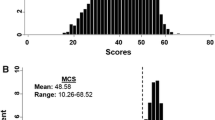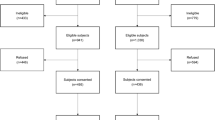Abstract
Purpose
Racial disparities are evident in colorectal cancer (CRC) prognosis with black patients experiencing worse outcomes than Hispanics and whites, yet mediators of these disparities are not fully known. The aim of this study is to identify variables that contribute to racial/ethnic disparities in health-related quality of life (HR-QoL) and overall survival in CRC.
Methods
Using SF-12 questionnaires, we assessed HR-QoL in 1132 CRC patients by calculating their physical (PCS) and mental composite summary (MCS) scores. Associations between poor PCS/MCS and sociodemographic factors were estimated and survival differences were identified by race/ethnicity.
Results
Hispanic patients who never married were at greater risk of poor PCS (OR 2.69; 95% CI 1.11–6.49; P = 0.028) than were currently married patients. College education was associated with a decreased risk of poor PCS in Hispanic and white, but not black, patients. Gender was significantly associated with poor MCS among white patients only. CRC patients who reported a poor PCS or MCS had poor survival, with differences in median survival times (MSTs) by race. The effect of PCS was strongest in white CRC patients with a difference in overall MST of > 116 months between those with favorable versus poor physical HR-QoL. Black patients who reported poor Physical and Mental HR-QoL showed significant risk of a poor outcome.
Conclusion
These findings suggest that racial/ethnic disparities in CRC survival may be related to differences in HR-QoL. Identified mediators of HR-QoL could supplement current CRC management strategies to improve patients’ survival.


Similar content being viewed by others
Data availability
The data that support the findings of this study are available from the corresponding author, upon reasonable request.
References
White, A., Vernon, S. W., Franzini, L., & Du, X. L. (2010). Racial disparities in colorectal cancer survival: To what extent are racial disparities explained by differences in treatment, tumor characteristics, or hospital characteristics? Cancer, 116(19), 4622–4631.
DeSantis, C. E., Siegel, R. L., Sauer, A. G., Miller, K. D., Fedewa, S. A., Alcaraz, K. I., et al. (2016). Cancer statistics for African Americans, 2016: Progress and opportunities in reducing racial disparities. CA: A Cancer Journal for Clinicians, 66(4), 290–308.
Wallace, K., DeToma, A., Lewin, D. N., Sun, S., Rockey, D., Britten, C. D., et al. (2016). Racial differences in Stage IV colorectal cancer survival in younger and older patients. Clinical Colorectal Cancer, 16(3), 178–186.
Siegel, R. L., Fedewa, S. A., Miller, K. D., Goding-Sauer, A., Pinheiro, P. S., Martinez-Tyson, D., et al. (2015). Cancer statistics for Hispanics/Latinos, 2015. CA: A Cancer Journal for Clinicians, 65(6), 457–480.
Reyes, M. E., Ye, Y., Zhou, Y., Liang, A., Kopetz, S., Rodriquez, M. A., et al. (2016). Predictors of health-related quality of life and association with survival may identify colorectal cancer patients at high risk of poor prognosis. Quality of Life Research, 26(2), 319–330.
Almutairi, K. M., Alhelih, E., Al-Ajlan, A. S., & Vinluan, J. M. (2016). A cross-sectional assessment of quality of life of colorectal cancer patients in Saudi Arabia. Clinical and Translational Oncology, 18(2), 144–152.
Cella, D. F., & Tulsky, D. S. (1993). Quality of life in cancer: Definition, purpose, and method of measurement. Cancer Investigation, 11(3), 327–336.
Quinten, C., Coens, C., Mauer, M., Comte, S., Sprangers, M. A., Cleeland, C., et al. (2009). Baseline quality of life as a prognostic indicator of survival: A meta-analysis of individual patient data from EORTC clinical trials. The Lancet Oncology, 10(9), 865–871.
Baussard, L., Stoebner-Delbarre, A., Bonnabel, L., Huteau, M. E., Gastou, A., & Cousson-Gelie, F. (2017). Development and validation of the daily fatigue cancer scale (DFCS): Single-item questions for clinical practice. European Journal of Oncology Nursing, 26, 42–48.
Li, L., Mo, F. K., Chan, S. L., Hui, E. P., Tang, N. S., Koh, J., et al. (2017). Prognostic values of EORTC QLQ-C30 and QLQ-HCC18 index-scores in patients with hepatocellular carcinoma—clinical application of health-related quality-of-life data. BMC Cancer, 17(1), 8.
Diouf, M., Filleron, T., Pointet, A. L., Dupont-Gossard, A. C., Malka, D., Artru, P., et al. (2016). Prognostic value of health-related quality of life in patients with metastatic pancreatic adenocarcinoma: A random forest methodology. Quality of Life Research, 25(7), 1713–1723.
De Aguiar, S. S., Bergmann, A., & Mattos, I. E. (2014). Quality of life as a predictor of overall survival after breast cancer treatment. Quality of Life Research, 23(2), 627–637.
Gotay, C. C., Kawamoto, C. T., Bottomley, A., & Efficace, F. (2008). The prognostic significance of patient-reported outcomes in cancer clinical trials. Journal of Clinical Oncology, 26(8), 1355–1363.
Braun, D. P., Gupta, D., Grutsch, J. F., & Staren, E. D. (2011). Can changes in health related quality of life scores predict survival in stages III and IV colorectal cancer? Health and Quality of Life Outcomes, 9, 62.
Wu, X., Hildebrandt, M. A., Ye, Y., Chow, W. H., Gu, J., Cunningham, S., et al. (2016). Cohort profile: The MD Anderson Cancer Patients and Survivors Cohort (MDA-CPSC). International Journal of Epidemiology, 45(3), 713–713f.
Ware, J., Jr., Kosinski, M., & Keller, S. D. (1996). A 12-Item Short-Form Health Survey: Construction of scales and preliminary tests of reliability and validity. Medical Care, 34(3), 220–233.
Pinheiro, L. C., Wheeler, S. B., Chen, R. C., Mayer, D. K., Lyons, J. C., & Reeve, B. B. (2015). The effects of cancer and racial disparities in health-related quality of life among older Americans: A case–control, population-based study. Cancer, 121(8), 1312–1320.
Lathan, C. S., Cronin, A., Tucker-Seeley, R., Zafar, S. Y., Ayanian, J. Z., & Schrag, D. (2016). Association of financial strain with symptom burden and quality of life for patients with lung or colorectal cancer. Journal of Clinical Oncology, 34(15), 1732–1740.
Pisu, M., Kenzik, K. M., Oster, R. A., Drentea, P., Ashing, K. T., Fouad, M., et al. (2015). Economic hardship of minority and non-minority cancer survivors 1 year after diagnosis: Another long-term effect of cancer? Cancer, 121(8), 1257–1264.
Phipps, E., Braitman, L. E., Stites, S., & Leighton, J. C. (2008). Quality of life and symptom attribution in long-term colon cancer survivors. Journal of Evaluation in Clinical Practice, 14(2), 254–258.
Simpson, D. R., Martinez, M. E., Gupta, S., Hattangadi-Gluth, J., Mell, L. K., Heestand, G., et al. (2013). Racial disparity in consultation, treatment, and the impact on survival in metastatic colorectal cancer. Journal of the National Cancer Institute, 105(23), 1814–1820.
Marcella, S., & Miller, J. E. (2001). Racial differences in colorectal cancer mortality. The importance of stage and socioeconomic status. Journal of Clinical Epidemiology, 54(4), 359–366.
Jackson, C. S., Oman, M., Patel, A. M., & Vega, K. J. (2016). Health disparities in colorectal cancer among racial and ethnic minorities in the United States. The Journal of Gastrointestinal Oncology, 7(Suppl 1), S32–43.
Lai, Y., Wang, C., Civan, J. M., Palazzo, J. P., Ye, Z., Hyslop, T., et al. (2016). Effects of cancer stage and treatment differences on racial disparities in survival from colon cancer: A United States Population-Based Study. Gastroenterology, 150(5), 1135–1146.
May, F. P., Glenn, B. A., Crespi, C., Ponce, N., Spiegel, B. M., & Bastani, R. (2016). Decreasing Black-White disparities in colorectal cancer incidence and stage at presentation in the United States. Cancer Epidemiology, Biomarkers & Prevention, 26(5), 762–768.
Tawk, R., Abner, A., Ashford, A., & Brown, C. P. (2015). Differences in colorectal cancer outcomes by race and insurance. International Journal of Environmental Research and Public Health, 13(1), 48. https://doi.org/10.3390/ijerph13010048.
Pinheiro, P. S., Williams, M., Miller, E. A., Easterday, S., Moonie, S., & Trapido, E. J. (2011). Cancer survival among Latinos and the Hispanic Paradox. Cancer Causes and Control, 22(4), 553–561.
Philips, B. U., Jr., Belasco, E., Markides, K. S., & Gong, G. (2013). Socioeconomic deprivation as a determinant of cancer mortality and the Hispanic paradox in Texas, USA. International Journal for Equity in Health, 12, 26.
Du, X. L., Fang, S., Vernon, S. W., El-Serag, H., Shih, Y. T., Davila, J., et al. (2007). Racial disparities and socioeconomic status in association with survival in a large population-based cohort of elderly patients with colon cancer. Cancer, 110(3), 660–669.
Yost, K. J., Hahn, E. A., Zaslavsky, A. M., Ayanian, J. Z., & West, D. W. (2008). Predictors of health-related quality of life in patients with colorectal cancer. Health and Quality of Life Outcomes, 6, 66.
Ward, W. L., Hahn, E. A., Mo, F., Hernandez, L., Tulsky, D. S., & Cella, D. (1999). Reliability and validity of the Functional Assessment of Cancer Therapy-Colorectal (FACT-C) quality of life instrument. Quality of Life Research, 8(3), 181–195.
Costa, A. L., Heitkemper, M. M., Alencar, G. P., Damiani, L. P., Silva, R. M., & Jarrett, M. E. (2016). Social support is a predictor of lower stress and higher quality of life and resilience in Brazilian patients with colorectal cancer. Cancer Nursing, 40(5), 352–360.
Thompson, T., Rodebaugh, T. L., Pérez, M., Schootman, M., & Jeffe, D. B. (2013). Perceived social support change in patients with early-stage breast cancer and controls. Health Psychology: Official Journal of the Division of Health Psychology, American Psychological Association, 32(8), 886–895.
Lipton, R. I. (1994). The effect of moderate alcohol use on the relationship between stress and depression. American Journal of Public Health, 84(12), 1913–1917.
Lipton, R. (1997). The relationship between alcohol, stress, and depression in Mexican Americans and non-Hispanic whites. Behavioral Medicine, 23(3), 101–111.
Patel, M. I., Schupp, C. W., Gomez, S. L., Chang, E. T., & Wakelee, H. A. (2013). How do social factors explain outcomes in non–small-cell lung cancer among Hispanics in California? Explaining the Hispanic paradox. Journal of Clinical Oncology, 31(28), 3572–3578.
Pinheiro, P. S., Sherman, R. L., Trapido, E. J., Fleming, L. E., Huang, Y., Gomez-Marin, O., et al. (2009). Cancer incidence in first generation U.S. Hispanics: Cubans, Mexicans, Puerto Ricans, and new Latinos. Cancer Epidemiology, Biomarkers & Prevention, 18(8), 2162–2169.
Stern, M. C., Fejerman, L., Das, R., Setiawan, V. W., Cruz-Correa, M. R., Perez-Stable, E. J., et al. (2016). Variability in cancer risk and outcomes within US Latinos by National origin and genetic ancestry. Current Epidemiology Reports, 3, 181–190.
Aragones, A., Hayes, S. L., Chen, M. H., González, J., & Gany, F. M. (2014). Characterization of the Hispanic or Latino population in health research: A systematic review. Journal of Immigrant and Minority Health, 16(3), 429–439.
Funding
Funding support for this study was provided in part by the Center for Translational and Public Health Genomics of MD Anderson and the NIH through MD Anderson's Cancer Center Support Grant CA016672.
Author information
Authors and Affiliations
Corresponding author
Ethics declarations
Conflict of interest
The authors declare that they have no conflicts of interest.
Human and animal rights
All procedures performed in studies involving human participants were in accordance with the ethical standards of the institutional and/or national research committee and with the 1964 Helsinki declaration and its later amendments or comparable ethical standards. This article does not contain any studies with animals performed by any of the authors.
Informed consent
Informed consent was obtained from all individual participants included in the study.
Additional information
Publisher's Note
Springer Nature remains neutral with regard to jurisdictional claims in published maps and institutional affiliations.
Electronic supplementary material
Below is the link to the electronic supplementary material.
Rights and permissions
About this article
Cite this article
Belachew, A.A., Reyes, M.E., Ye, Y. et al. Patterns of racial/ethnic disparities in baseline health-related quality of life and relationship with overall survival in patients with colorectal cancer. Qual Life Res 29, 2977–2986 (2020). https://doi.org/10.1007/s11136-020-02565-8
Accepted:
Published:
Issue Date:
DOI: https://doi.org/10.1007/s11136-020-02565-8




